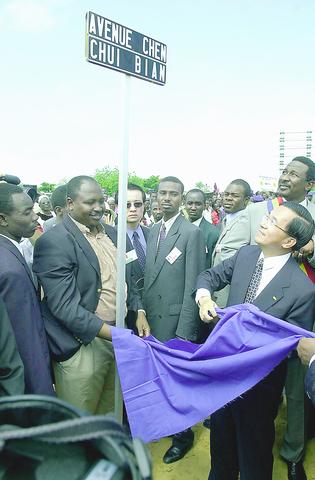As only the second ever non-African head of state to visit Chad, Taiwan's President Chen Shui-bian (陳水扁) was given on Wednesday evening in its capital, N'Djamena, the most elaborate welcome of his six-country tour.
Chad had even, to Chen's surprise, named a 10km road running from the capital to the bridge across the Chari River, "Avenue Chen Shui-bian," as a token of its gratitude for Taiwan's assistance in improving its communications system. On seeing the road sign, Chen proposed that it be changed to "Avenue ROC." Eventually "Taiwan Avenue" was agreed upon.
Chad will also name the bridge for whose construction Taiwan donated US$20 million, "Taiwan Bridge." Chad is the last stop on Chen's first presidential foreign visit, which has included three countries in Central America and three in west Africa.

PHOTO: CHEN CHENG-CHANG, TAIPEI TIMES
Thousands of people crowded the streets from the airport to Chad's presidential mansion to welcome Chen.
Members of the crowd, estimated by the delegation to be even larger than that which turned out to welcome the president in the Gambian capital Banjul, brandished national flags and banners of both countries, chanted words of welcome, and sang and danced to celebrate Chen's arrival.
Accompanying Chad's President Idriss Deby, Chen stood in a stretch limousine, leading a thirty-car motorcade, and waved to the crowds.
Posters of Deby and of Chen, the latter provided by Taiwan's embassy, bedecked walls, trees, and the doors of houses seemingly ubiquitously.
According to officials from Taiwan's embassy, the Chad government ordered the cleaning of all major streets in the capital a week ago and the national television channel repeatedly broadcast popular Taiwanese music and broadcast details of Chen's life.
Taiwan's Ambassador, Chiu Chung-jen (邱仲仁), said that the government had granted half a day's holiday for the occasion.
The first non-African head of state to visit Chad was former French president, Charles De Gaulle, who visited in the 1960s as head of the country's former colonial master. Chad declared independence from France in 1960.
Deby expressed a hearty welcome while meeting with Chen, saying the assistance of the Republic of China over the past three years had improved Chad's development "efficiently."
"Not only in agricultural development and highway construction but also in culture, politics, health and economics we have accomplished much," Deby told Chen. Deby pointed out that Taiwan-Chad relations stretched as far back as the 1960s.
Chad first established ties with Taiwan in 1962 but opened its door to the People's Republic of China in 1972, prompting Taiwan to immediately sever diplomatic relations.
The two countries re-established diplomatic relations in 1997 following the granting by Taiwan of substantial financial aid to Chad in the 1990s.
Ambassador Chiu said that since the World Development Bank approved a project allowing Chad to drill for oil in July this year, the nation would receive US$2 billion per year once requisite construction work had been completed in four years' time.
Chiu, however, said that oil revenues would only be likely to last 25 years.

The CIA has a message for Chinese government officials worried about their place in Chinese President Xi Jinping’s (習近平) government: Come work with us. The agency released two Mandarin-language videos on social media on Thursday inviting disgruntled officials to contact the CIA. The recruitment videos posted on YouTube and X racked up more than 5 million views combined in their first day. The outreach comes as CIA Director John Ratcliffe has vowed to boost the agency’s use of intelligence from human sources and its focus on China, which has recently targeted US officials with its own espionage operations. The videos are “aimed at

STEADFAST FRIEND: The bills encourage increased Taiwan-US engagement and address China’s distortion of UN Resolution 2758 to isolate Taiwan internationally The Presidential Office yesterday thanked the US House of Representatives for unanimously passing two Taiwan-related bills highlighting its solid support for Taiwan’s democracy and global participation, and for deepening bilateral relations. One of the bills, the Taiwan Assurance Implementation Act, requires the US Department of State to periodically review its guidelines for engagement with Taiwan, and report to the US Congress on the guidelines and plans to lift self-imposed limitations on US-Taiwan engagement. The other bill is the Taiwan International Solidarity Act, which clarifies that UN Resolution 2758 does not address the issue of the representation of Taiwan or its people in

US Indo-Pacific Commander Admiral Samuel Paparo on Friday expressed concern over the rate at which China is diversifying its military exercises, the Financial Times (FT) reported on Saturday. “The rates of change on the depth and breadth of their exercises is the one non-linear effect that I’ve seen in the last year that wakes me up at night or keeps me up at night,” Paparo was quoted by FT as saying while attending the annual Sedona Forum at the McCain Institute in Arizona. Paparo also expressed concern over the speed with which China was expanding its military. While the US

SHIFT: Taiwan’s better-than-expected first-quarter GDP and signs of weakness in the US have driven global capital back to emerging markets, the central bank head said The central bank yesterday blamed market speculation for the steep rise in the local currency, and urged exporters and financial institutions to stay calm and stop panic sell-offs to avoid hurting their own profitability. The nation’s top monetary policymaker said that it would step in, if necessary, to maintain order and stability in the foreign exchange market. The remarks came as the NT dollar yesterday closed up NT$0.919 to NT$30.145 against the US dollar in Taipei trading, after rising as high as NT$29.59 in intraday trading. The local currency has surged 5.85 percent against the greenback over the past two sessions, central